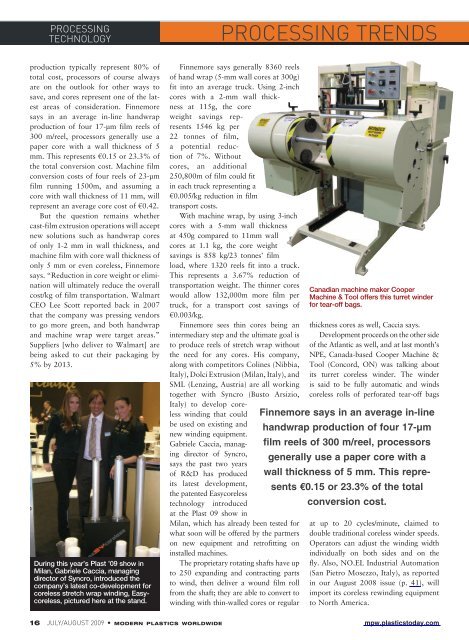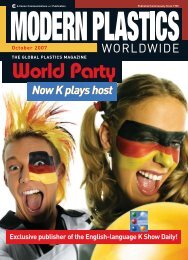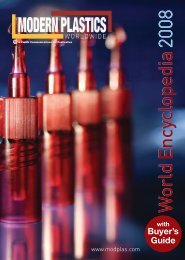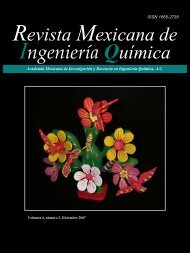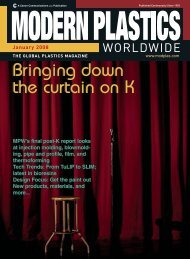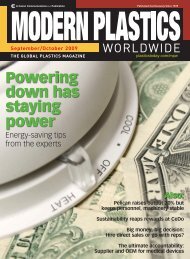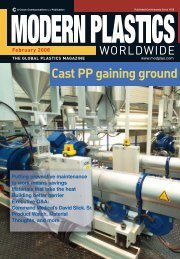Modern Plastics Worldwide - July/August 2009 - dae uptlax
Modern Plastics Worldwide - July/August 2009 - dae uptlax
Modern Plastics Worldwide - July/August 2009 - dae uptlax
You also want an ePaper? Increase the reach of your titles
YUMPU automatically turns print PDFs into web optimized ePapers that Google loves.
PROCESSING<br />
TECHNOLOGY<br />
production typically represent 80% of<br />
total cost, processors of course always<br />
are on the outlook for other ways to<br />
save, and cores represent one of the latest<br />
areas of consideration. Finnemore<br />
says in an average in-line handwrap<br />
production of four 17-μm film reels of<br />
300 m/reel, processors generally use a<br />
paper core with a wall thickness of 5<br />
mm. This represents €0.15 or 23.3% of<br />
the total conversion cost. Machine film<br />
conversion costs of four reels of 23-μm<br />
film running 1500m, and assuming a<br />
core with wall thickness of 11 mm, will<br />
represent an average core cost of €0.42.<br />
But the question remains whether<br />
cast-film extrusion operations will accept<br />
new solutions such as handwrap cores<br />
of only 1-2 mm in wall thickness, and<br />
machine film with core wall thickness of<br />
only 5 mm or even coreless, Finnemore<br />
says. “Reduction in core weight or elimination<br />
will ultimately reduce the overall<br />
cost/kg of film transportation. Walmart<br />
CEO Lee Scott reported back in 2007<br />
that the company was pressing vendors<br />
to go more green, and both handwrap<br />
and machine wrap were target areas.”<br />
Suppliers [who deliver to Walmart] are<br />
being asked to cut their packaging by<br />
5% by 2013.<br />
During this year’s Plast ’09 show in<br />
Milan, Gabriele Caccia, managing<br />
director of Syncro, introduced the<br />
company’s latest co-development for<br />
coreless stretch wrap winding, Easycoreless,<br />
pictured here at the stand.<br />
PROCESSING TRENDS<br />
Finnemore says generally 8360 reels<br />
of hand wrap (5-mm wall cores at 300g)<br />
fit into an average truck. Using 2-inch<br />
cores with a 2-mm wall thickness<br />
at 115g, the core<br />
weight savings represents<br />
1546 kg per<br />
22 tonnes of film,<br />
a potential reduction<br />
of 7%. Without<br />
cores, an additional<br />
250,800m of film could fit<br />
in each truck representing a<br />
€0.005/kg reduction in film<br />
transport costs.<br />
With machine wrap, by using 3-inch<br />
cores with a 5-mm wall thickness<br />
at 450g compared to 11mm wall<br />
cores at 1.1 kg, the core weight<br />
savings is 858 kg/23 tonnes’ film<br />
load, where 1320 reels fit into a truck.<br />
This represents a 3.67% reduction of<br />
transportation weight. The thinner cores<br />
would allow 132,000m more film per<br />
truck, for a transport cost savings of<br />
€0.003/kg.<br />
Finnemore sees thin cores being an<br />
intermediary step and the ultimate goal is<br />
to produce reels of stretch wrap without<br />
the need for any cores. His company,<br />
along with competitors Colines (Nibbia,<br />
Italy), Dolci Extrusion (Milan, Italy), and<br />
SML (Lenzing, Austria) are all working<br />
together with Syncro (Busto Arsizio,<br />
Italy) to develop coreless<br />
winding that could<br />
be used on existing and<br />
new winding equipment.<br />
Gabriele Caccia, managing<br />
director of Syncro,<br />
says the past two years<br />
of R&D has produced<br />
its latest development,<br />
the patented Easycoreless<br />
technology introduced<br />
at the Plast 09 show in<br />
Milan, which has already been tested for<br />
what soon will be offered by the partners<br />
on new equipment and retrofitting on<br />
installed machines.<br />
The proprietary rotating shafts have up<br />
to 250 expanding and contracting parts<br />
to wind, then deliver a wound film roll<br />
from the shaft; they are able to convert to<br />
winding with thin-walled cores or regular<br />
Canadian machine maker Cooper<br />
Machine & Tool offers this turret winder<br />
for tear-off bags.<br />
thickness cores as well, Caccia says.<br />
Development proceeds on the other side<br />
of the Atlantic as well, and at last month’s<br />
NPE, Canada-based Cooper Machine &<br />
Tool (Concord, ON) was talking about<br />
its turret coreless winder. The winder<br />
is said to be fully automatic and winds<br />
coreless rolls of perforated tear-off bags<br />
Finnemore says in an average in-line<br />
handwrap production of four 17-μm<br />
fi lm reels of 300 m/reel, processors<br />
generally use a paper core with a<br />
wall thickness of 5 mm. This represents<br />
€0.15 or 23.3% of the total<br />
conversion cost.<br />
at up to 20 cycles/minute, claimed to<br />
double traditional coreless winder speeds.<br />
Operators can adjust the winding width<br />
individually on both sides and on the<br />
fly. Also, NO.EL Industrial Automation<br />
(San Pietro Mosezzo, Italy), as reported<br />
in our <strong>August</strong> 2008 issue (p. 41), will<br />
import its coreless rewinding equipment<br />
to North America.<br />
16 JULY/AUGUST <strong>2009</strong> • MODERN PLASTICS WORLDWIDE mpw.plasticstoday.com


